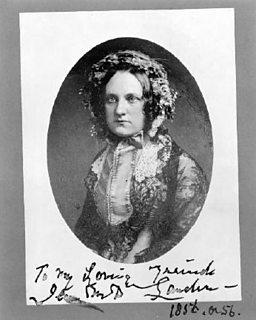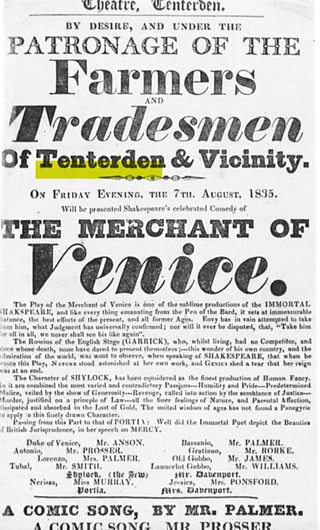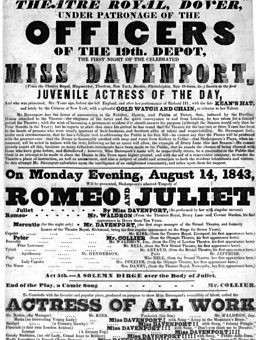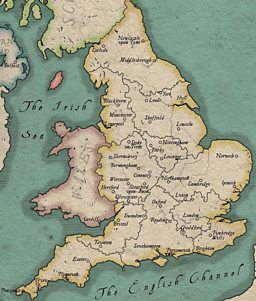Dover Theatre and Miss Davenport
'The juvenile actress of the day'
In 1843, for the first time in more than a hundred years, the laws around theatre performances were relaxed.
The changes were the result of a parliamentary Select Committee investigation into the state of British drama.
-
![]()
Much ado near me
Hear more Shakespeare stories on BBC Radio Kent
-
![]()
Shakespeare Festival 2016
The BBC celebrates the genius of the bard

Although censorship remained, the 1843 Theatres Act removed the strict controls which had only allowed theatres awarded a patent to stage a performance.
Now, any licensed theatre (and it was easier to obtain a licence) could perform whatever they wanted, for as long as they wished, including Shakespeare. However, the old patent theatres maintained their status as prestigious venues and continued to be considered top-tier venues.
As many provincial towns grew larger, more and more began to desire a permanent playhouse with a resident theatre company.
A select few were issued patents by act of parliament. This allowed them to take the name ‘Theatre Royal’, and granted the same rights that Drury Lane and Covent Garden enjoyed: the right to perform all drama – including Shakespeare - in as long a season as they desired. Earning the patent was a sign of prestige, and the Theatres Royal (as they were known) attracted the top London stars when they went on tour.
It was against this background, and in this landmark year of 1843, that child actress ‘Miss Davenport’ played Juliet in Romeo and Juliet at the Theatre Royal in Dover. The surviving playbill, now digitised by the British Library, tells the story of this rising ‘Juvenile’ star who had already played in London and the US, and was awarded famous Shakespearean actor Edmund Kean’s hat following her recent performance in Richard III.

But the playbill (on the right) also tells another story – that of the struggles of running a provincial theatre to the standards of London’s by now well-established venues.
In the text of the playbill, the theatre’s new manager Mr Davenport, who we assume to be the child actor’s father, viciously criticises the venue’s previous owners, which he says has been: “…in the hands of persons who were totally ignorant of their business, and destitute alike of talent and respectability”.
He talks of taking it to a "higher ground" but urges the crowd to bear with him, as he cannot guarantee that the plays will be performed "with the greatest care" or even that the place will be properly cleaned in time!
Tenterden - Farmers and tradesmen only
The extent to which Shakespeare was by now revered, more than two centuries after his death, is clear in this flyer, in which the Bard is portrayed almost as a God-like figure.

Here, The Merchant of Venice is described as one of "the sublime productions of the Immortal Shakespeare, and like everything emanating from the Pen of the Bard, it sets at immeasurable distance, the best efforts of the present, and all former Ages."
It says that the famous Shakespearean actor Garrick’s reaction to the play was that “…Nature stood astonished at her own work, and Genius shed a tear, that her reign was at an end.”
This playbill is also interesting because it states that this performance of The Merchant of Venice is "by desired and under the patronage of the farmers and tradesmen of Tenterden and vicinity."
This says something about the fact that people from all walks of life enjoyed and wanted to see Shakespeare performed…and that the plays were not exclusively on offer in towns and cities such as Dover, and the new ‘Theatres Royal’.
Groups or individuals at this time often paid for bespoke productions at their local theatres. We can see this among the playbills which say “For the benefit of…”, or in this case “Under the Patronage of..”
About Shakespeare on Tour
From the moment they were written through to the present day, Shakespeare’s plays have continued to enthral and inspire audiences. They’ve been performed in venues big and small – including inns, private houses and emerging provincial theatres.

BBC English Regions is building a digital picture which tracks some of the many iconic moments across the country as we follow the ‘explosion’ in the performance of The Bard’s plays, from his own lifetime to recent times.
Drawing on fascinating new research from Records of Early English Drama (REED), plus the British Library's extensive collection of playbills, as well as expertise from De Montfort University and the Arts and Humanities Research Council, Shakespeare on Tour is a unique timeline of iconic moments of those performances, starting with his own troupe of actors, to highlights from more recent times. Listen out for stories on Shakespeare’s legacy on your BBC Local Radio station from Monday 21 March, 2016.
You never know - you might find evidence of Shakespeare’s footsteps close to home…
Craig Henderson, BBC English Regions
-
![]()
Shakespeare Lives
The nation’s greatest performing arts institutions mark 400 years since the Bard's death

Related Links


Miss Davenport in Dover
Hear more about the 'juvenile' star from the British Library's Hannah Manktelow
Shakespeare on Tour: Around Kent
-
![]()
Touring Kent to avoid the plague in London
Shakespeare's Lord Strange’s Men perform in Kent
-
![]()
‘Wherefore to Dover?’
Dover, Faversham and the 1597 tour
-
![]()
A rare example of a surviving Shakespearean venue
Likely to have staged a Shakespeare play during the dramatist’s own lifetime
-
![]()
Small towns big on Shakespeare
How Shakespeare's company visited the smallest towns
-
![]()
Mrs Hamblin - A woman scorned
The tumultuous private life of a famous American actress
-
![]()
Sir Edward Dering – Proud owner of Shakespeare’s First Folio
And possibly the host of the first amateur performance of Shakespeare
Shakespeare on Tour: Around the country
-
![]()
Lancaster Theatre sparkles with Shakespearean talent
The Grand Theatre in Lancaster, which was once managed by Stephen Kemble
-
![]()
Reading’s Puritans turn away Shakespeare
Shakespeare's men paid not to play in Reading
-
![]()
Belvoir Castle
Belvoir Castle, home of the Duke of Rutland
-
![]()
Did Shakespeare visit Bristol in 1597?
Civic accounts show a high amount of performances in Bath













